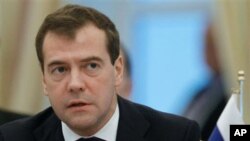Russia is helping NATO in Afghanistan and keeping an open mind about a NATO missile-defense shield over Europe.
NATO is offering Russia "a fresh start" - and the Kremlin is interested.
Following a series of friendly meetings with U.S. President Barack Obama, Russian President Dmitry Medvedev is to address the NATO-Russia summit Saturday in Lisbon. This will be the highest-level such meeting since Russia invaded Georgia two years ago and pushed relations to rock bottom.
In Lisbon, Russia's president is expected to offer wider help to the U.S.-led war effort in Afghanistan. On the American-led missile defense shield for Europe, he is offering an open mind.
President Obama has noticed the change, saying after meeting with Russia's president Sunday in Japan, "I am glad to have him as an excellent partner on a whole range of issues."
In Moscow, Air Force Commander Alexander Zelin told Interfax after briefing foreign air force attaches, "We will continue developing our air and space defenses and tackling tasks of non-strategic and strategic air defenses. God willing, we will tackle this task jointly with NATO."
But in November 2008, President Medvedev denounced the American missile-defense plan and vowed to deploy missiles and radar-jamming equipment near Russia's border with Poland.
Much has changed since then, as Russia's economy has fallen back, and China's economy has jumped forward.
'Junior partner'
Russian political analyst Konstantin von Eggert says China increasingly treats Russia as a junior partner, is elbowing Russia out of Central Asia, and is leaping ahead of Russia in the quality of its military technologies. He says the Kremlin took note of China's recent aggressive moves against Japanese and Vietnamese sea claims.
"I have heard quite a few people among the military who say they look east as the rising source of danger," he said.
But on the European end of Russia's Eurasian landmass, Russians say President Obama does not share George W. Bush's interest in expanding NATO to Russia's borders. A pro-Russian government in Ukraine is essentially dropping Ukraine's NATO candidacy, and Georgia remains embroiled in fights with Russia and two Kremlin-supported secessionist provinces. As a result, there is little support inside NATO to admit Georgia to Europe's self-defense club.
Moscow analyst Mikhail Troitsky says Russia needs European capital and technology to get its economic growth back.
'Reapproachement'
"You cannot advance in modernization by attracting foreign investment and best practices if you remain in relations of mutual deterrence with the countries that you consider to be the main sources of those technologies. The rapprochement with NATO is being driven by considerations of that kind," he said.
Indeed, as the Kremlin caters to Russia's middle class, Moscow's loudest demands on Europe have recently been for a visa-free regime for Russian tourists.
Russia's NATO turnaround is most striking with Afghanistan. During the Bush years, the Kremlin largely complained about the NATO military operation in Afghanistan. But, with the Obama administration announcing that it will start to end major combat operations in Afghanistan next summer, Russia's leaders are pondering a post-NATO Afghanistan.
Kremlin's major concern
If the drawdown of NATO's 120,000 troops destabilizes the Kabul government, analyst Von Eggert says Islamic fundamentalism could spread north into the five Central Asian nations that once were Soviet republics.
"Russia has in fact transparent, translucent borders with the Central Asian states," he said. "So whatever Islamic radicalism is going to be imported into places like Tajikistan, Kyrgystan, Kazakhstan, it is going to go all the way - straight to Moscow. This is something that gives a lot of Russian decision makers creeps."
In Lisbon, Russia is to offer to allow NATO to ship back and forth across Russia heavy lethal equipment, such as armored personnel carriers for to Afghanistan. Current arrangements allow only for the one-way transport of non-lethal NATO supplies, such as food and fuel. Last week, Russian cargo planes delivered 20,000 Kalashnikov rifles to Kabul.
At the NATO meeting, Russia is expected to agree to send to Afghanistan 20 MI-17 transport helicopters and to train Afghan pilots and mechanics. In the late 1970s, Soviet engineers designed these helicopters specifically for the Soviet war in Afghanistan. In that war, Soviet forces suffered 15,000 dead and 50,000 wounded.
Today Russia's NATO envoy Dmitry Rogozin says sending Russian troops to Afghanistan is "taboo." He tells Ria Novosti, "We have already been in Afghanistan, and we did not like it."
The closest Russia has come is allowing four of its anti-narcotics agents to participate in recent American raids against drug laboratories in Afghanistan. About two million Russians are addicted to heroin and opium, which largely come from Afghanistan. On Saturday, Russia is to offer to open a counter-narcotics center near St. Petersburg to train agents from Afghanistan and Central Asia.
True mood changes?
Russia's new cooperation with NATO has its critics.
Russian Communist Party leader Gennady Zyuganov warns Interfax the Kremlin is preparing to join "the surviving elements of the Russian Army and Navy to the U.S. and NATO expedition forces. All this means is that Russia is voluntarily leaving the ranks of the world's leading powers."
Some Europeans wonder if Russia truly plans to cooperate with NATO. Historically Russia's closest neighbors have given the earliest and most accurate alerts about mood changes of the Russian bear.
Now, Poland President Bronislaw Komorowski worries the cooperation could be real. In a newspaper essay, he warns about NATO developing relations with Russia "at the expense of the security interests of other countries in Eastern Europe."




